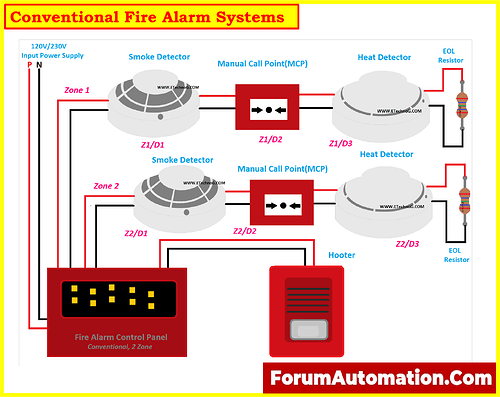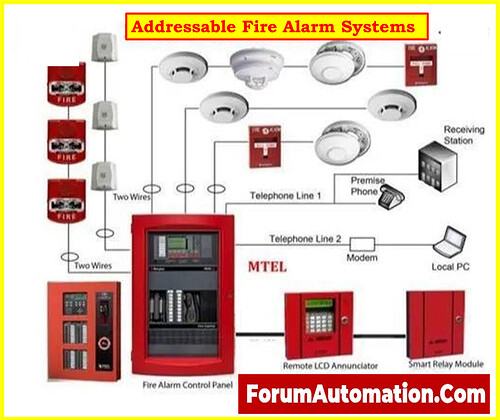What is the Difference between Addressable and Conventional Fire Alarm Panels?
- Fire alarm systems are a critical component of building safety, and the choice between conventional and addressable systems can significantly impact the level of protection and functionality in a given facility.
- These two types of fire alarm systems differ in several key aspects, including communication, wiring, location detection, cost, and functionality.
- Understanding the differences between conventional and addressable systems is essential to make the right choice for your specific building.
Conventional Fire Alarm Systems
Communication:
- Conventional fire alarm systems have been in use for many years and rely on a zone-based communication approach.
- In a conventional system, multiple devices, such as smoke detectors, pull stations, or heat detectors, are grouped into zones or circuits.
- Each zone connects to the fire alarm control panel through a dedicated wire. When a device within a zone detects a fire or an alarm condition, the control panel receives a signal indicating that the zone is in alarm.
- However, the panel can’t pinpoint which specific device within the zone triggered the alarm. Instead, it provides a general “Zone Alarm” indication.
Wiring:
- The conventional system’s wiring involves separate wires for each device within a zone, leading to a more complex and extensive wiring infrastructure.
- This can be labor-intensive and time-consuming, making it costlier in terms of installation.
Location Detection:
- In a conventional system, the alarm panel informs you of the zone in which an alarm has occurred, but it does not specify the precise location or device that triggered the alarm.
- This limitation can create delays in identifying the source of a fire, as responders may need to investigate multiple devices within the same zone.
Cost:
- While conventional fire alarm systems typically have a lower initial equipment cost, their labor-intensive installation process can result in higher overall installation costs.
- Additionally, they may lead to increased operational costs due to slower response times and potential false alarms.
Functionality:
- Conventional systems are relatively basic in functionality. They lack the sophistication of addressable systems, offering limited control and flexibility. They may not provide detailed information about the location and type of alarm, leading to slower response times and increased risks associated with false alarms.
Addressable Fire Alarm Systems:
Communication
- Addressable fire alarm systems are more modern and advanced, providing a significant improvement in communication.
- In an addressable system, each individual field device, whether a smoke detector or a pull station, has its own unique address and connects to the fire alarm control panel through a single communication circuit.
- This direct communication allows the panel to receive detailed information from each device.
Wiring
- Addressable systems require less cabling compared to conventional systems, as each device is connected to a common communication circuit.
- This streamlined wiring simplifies installation, reduces material costs, and minimizes labor requirements.
Location Detection
- Addressable systems offer precise location detection. Each device is assigned a specific address (typically a 3-digit number), and the panel is programmed to recognize the type and location of each device.
- When an alarm occurs, the panel can provide detailed information about the device that triggered the alarm and its exact location within the building.
- For example, it can display a message like “Alarm Smoke Detector (Address: 023) 1st Floor Hall at Room 102.”
- This level of detail significantly improves response times, aids in faster fire extinguishment, and enhances overall safety.
Cost
- While addressable fire alarm systems may have a higher initial equipment cost, they are more cost-efficient in the long run.
- Their streamlined installation and precise location detection reduce operational costs, as they are less likely to signal false alarms.
- Additionally, their accuracy in detecting fires can prevent fire damage, potentially saving money in the event of a real fire.
Functionality
- Addressable systems are considered “intelligent” fire alarm systems due to their advanced functionality.
- They offer greater control and flexibility, allowing individual programming of each device.
- This means you can set specific responses for each device, such as differentiating between a smoke detector and a duct detector.
- Addressable systems are more reliable when it comes to false alarms, as they provide comprehensive information about the type and location of an alarm.
Choosing the Right System for Your Building:
- The choice between conventional and addressable fire alarm systems depends on several factors.
- Conventional systems may still be suitable for very small applications or for customers who prefer not to upgrade.
- However, for larger buildings or those where precise location detection and fast response times are critical, addressable systems are generally the safer option.
- Addressable systems provide detailed information that can be invaluable to first responders and building occupants in the event of a fire.
Selecting a Fire Protection Company
-
When seeking a company to install, inspect, or maintain your fire alarm system, it’s crucial to consider various factors. Knowledge, experience, and customer service are essential criteria for selecting a reputable fire protection company. Companies like Fire Systems, Inc. offer comprehensive services, including installation, repairs, maintenance, and monitoring. This integrated approach provides an extra layer of protection and convenience, enhancing overall fire safety and security.
-
The choice between conventional and addressable fire alarm systems is a critical decision for building owners and managers.
-
Addressable systems offer superior communication, location detection, and cost-efficiency, making them the preferred choice for larger buildings or facilities where precise information and quick response times are essential.
-
When selecting a fire protection company, it’s important to prioritize both technical expertise and customer service to ensure the safety and security of your building.

